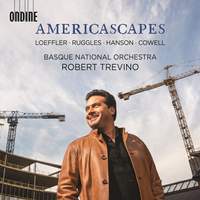Recording of the Week,
Americascapes from Robert Trevino and the Basque National Orchestra
Today’s Recording of the Week draws together four composers from a fascinating period when the USA was really beginning to forge its own, independent and truly American, classical voice. None quite made it into the public consciousness with a “hit” like those of Copland or Barber – and indeed the penultimate work featured here has never been recorded before at all. Nevertheless, conductor Robert Trevino hails all four as part of the rich tapestry of diversity that represents the idea of America, and under his baton the Basque National Orchestra makes a gripping, convincing case for all four works.
 Aptly, we open with a European emigrant – the Berlin-born Charles Loeffler. The booklet likens the music of his Maeterlinck-inspired La Mort de Tintagiles to “Rimsky-Korsakov’s Scheherazade as it might have been rewritten by Gabriel Fauré”, and it’s not hard to catch echoes of Richard Strauss in the mix as well. While not a concerto, it assigns a prominent role to the viola d’amore – in the vein of Harold in Italy’s viola-protagonist – here played sensitively by Delphine Dupuy.
Aptly, we open with a European emigrant – the Berlin-born Charles Loeffler. The booklet likens the music of his Maeterlinck-inspired La Mort de Tintagiles to “Rimsky-Korsakov’s Scheherazade as it might have been rewritten by Gabriel Fauré”, and it’s not hard to catch echoes of Richard Strauss in the mix as well. While not a concerto, it assigns a prominent role to the viola d’amore – in the vein of Harold in Italy’s viola-protagonist – here played sensitively by Delphine Dupuy.
Carl Ruggles’s 1943 Evocations work a very different magic; Ruggles may have been similarly perfectionist in his outlook to Loeffler but the two shared little else in common. John Kirkpatrick’s recording of the piano version of Evocations was given the dubious honour of featuring in the Guardian’s “101 strangest records on Spotify” series a few years ago, and it’s hard to disagree; the sound-world is unfamiliar and rarely easy. It’s firmly atonal, highly dissonant throughout, but never cacophonous and certainly not chaotic - Ruggles was uninterested in the aleatoric experiments of some of his contemporaries. It’s abundantly clear that there is a profoundly cerebral ordering intelligence behind the music, even if the exact nature of this compositional logic (and the question of what precisely is being evoked) remains largely opaque to the listener.
Howard Hanson may be best known for his Second Symphony, excerpts from which saw unauthorised use as an unexpectedly warm and luxuriant finale to the science-fiction horror blockbuster Alien (1979). After the bracing cold shower of Ruggles’s Evocations, I must shamefacedly admit that the sweepingly majestic opening of Hanson’s 1920 Before the Dawn elicited a slight feeling of relief and relaxation; we are firmly back in tonal, neo-Romantic country, with the influence of Respighi particularly audible.
Hanson was a tireless advocate for American classical music – bolstering the newly-founded Eastman School of Music’s reputation, and championing contemporary American composers in concerts and recordings for decades. As part of these efforts he helped set up the Edward B. Benjamin Prize “for calming and uplifting music” – a charmingly-titled award that ran from 1953-71, and which indirectly led to the commissioning of Ulysses Kay’s Umbrian Scene, which featured on one of the Presto team’s 100 Recordings of the Year in 2020. Before the Dawn itself is of course much more than merely “calming and uplifting”, but Hanson’s focus on approachable and pleasant music, in a time when these were sometimes unfashionable qualities, can be heard throughout.
Finally we reach Henry Cowell, perhaps the best-known composer on the album. His music seems to fall into two periods, divided by a prison sentence from 1937-40 for homosexuality. This traumatic experience is thought to have prompted a kind of Shostakovich-style response by the initially ultra-modernist, iconoclastic composer, who took a notable turn towards more conservative musical styles for the remainder of his life as well as a more cautious line on politics.
The 1956 Variations for Orchestra (in fact written in Shah-era Iran, one of a number of Asian countries whose music he had studied and drawn on) come from this second period. They lack Cowell’s earlier overt preoccupation with rhythmic complexity and “forearm smashes on the keyboard”, but they shouldn’t be thought of as unadventurous music by any means. We hear wide-open soundworlds of Appalachian Spring-like innocence, nervous and choppy dissonance, eerie proto-Rautavaara string clusters and generous use of a wide variety of percussion before the music powers home to a conclusion that seems to narrowly avoid exploding into chaos. A fittingly eclectic, dynamic finale to an album celebrating those very qualities in the music of America.
Basque National Orchestra, Robert Trevino
Available Formats: CD, MP3, FLAC, Hi-Res FLAC



